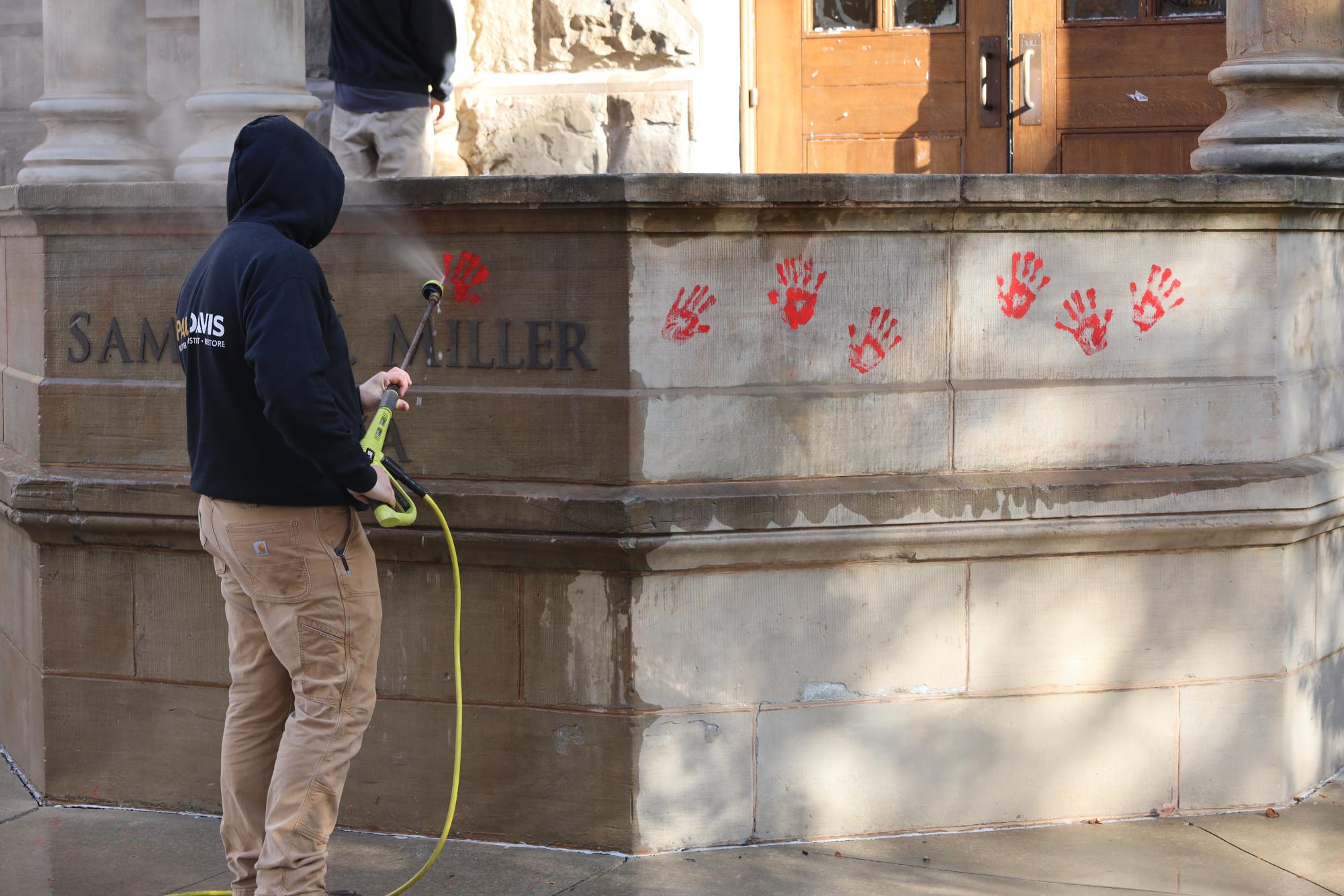Eleven activists arrested in connection to last fall’s campus vandalism incident held a press conference Saturday, Oct. 4, in which speakers gave updates on their ongoing legal proceedings and alleged that Case Western Reserve University is suppressing student expression by taking retaliatory measures against pro-Palestinian sentiments. Dubbed “CWRU 11,” the group includes six individuals who were enrolled in the university at the time of the alleged vandalism.
The university alleges that between 3:30 and 4:30 a.m. on Nov. 8, 2024, a group of activists, including six CWRU students and one Cleveland Institute of Art student, plastered posters and painted messages across campus. Phrases written included “We are complicit in genocide” and “Free Gaza” on walls and walkways around Adelbert Hall, the Binary Walkway, the Case Western Reserve University School of Law and the Jack, Joseph and Morton Mandel School of Applied Social Sciences.
Later that day, President Eric Kaler sent a campus wide email addressing the vandalism.
“A group of individuals vandalized multiple buildings, structures and artwork on our campus with paint and glued posters, some of which included what the university considers antisemitic language or symbols,” he said. “We strongly condemn the actions of these individuals and are investigating the incidents. Any individual found to have been involved in vandalizing our campus will be subject to the relevant university conduct process and criminal charges.”
Following the event, four CWRU students were arrested and held in Cuyahoga County Jail in the days after the incident. Months later, on Feb. 18, 11 individuals were officially indicted by a grand jury on the charges of vandalism, possessing criminal tools and breaking and entering. One of the accused was additionally indicted with “telecommunications harassment” for allegedly repeatedly calling an associate dean.
In a press release for the case, the Cuyahoga County Prosecutor Michael C. O’Malley reiterated the importance of peaceful protest, but stated that individuals must be held responsible for criminal acts.
“Peaceful protests are a cornerstone of our democracy,” O’Malley said. “When demonstrators cross over the line and commit criminal acts, it is our responsibility to hold those individuals responsible.”
Over the past few months the indicted activists attended pre-trial hearings, with ten of the 11 entering a pre-trial diversion program. The Observer was unable to independently confirm that all 11 were deemed eligible for acceptance into the diversion program.
During Saturday’s press conference, the group alleged the terms of their pre-trial diversion. They stated that they were required “to pay back $400,000 collectively within the next year in order to drop all potential charges.” The university alleges that $400,000 is the amount of damages caused by the vandalism, which the activists stated they believe is inflated.
They also claimed the program requires “regular drug tests,” “[having] to report back to the university” and “[asking] permission to leave the county.” It was also stated that many of the individuals who were students at the time of the arrest are still undergoing student conduct proceedings with the university, with one student having already been expelled.
One of the indicted activists, Benjamin Mullin-Vanneste, a fourth year at the time of his arrest, commented on the university’s actions.
“Even though the university will be reimbursed for these damages, they still seek permanent termination of our undergraduate pathway at Case, so there seems to be particular animus towards us,” Mullin-Vanneste said. “It doesn’t seem to just be about policy or accountability. This is about making an example of us to stifle any dissent and about silencing the movement for Palestine.”
During the press conference, Mullin-Vanneste also spoke about his own experiences with the university after his alleged involvement in the incident.
“I was arrested in January, a night before I was supposed to begin the final semester of my undergraduate career,” he said. “I was offered my diploma by the university in exchange for full cooperation, meaning that if I reported to them the identity of individuals that they think were involved, then I would receive my diploma from Case Western Reserve University. When I rejected this, they shut down negotiations completely.”
Another indicted activist and CWRU student at the time of the arrest, Raïssa Rih-reh, criticized the university’s approach to student protest.
“I stand before you as someone who has experienced imprisonment and long, drawn out legal proceedings intentionally designed to intimidate, confuse and diminish hope,” Rih-reh said. “Universities, like Case Western Reserve University, should be crucibles of critical thought and training grounds for changemakers. Yet they have far strayed from that mission.”
Due to legal circumstances, the 11 individuals were unable to provide further comments to The Observer. The university also declined to provide comment, stating that they don’t “comment on ongoing legal proceedings.”
The war in Gaza has been described as a genocide by several prominent human-rights organizations, including Amnesty International and the International Association of Genocide Scholars. Saturday’s press conference echoes nationwide concerns about universities taking action against non-violent protests following the pro-Palestinian movement.



